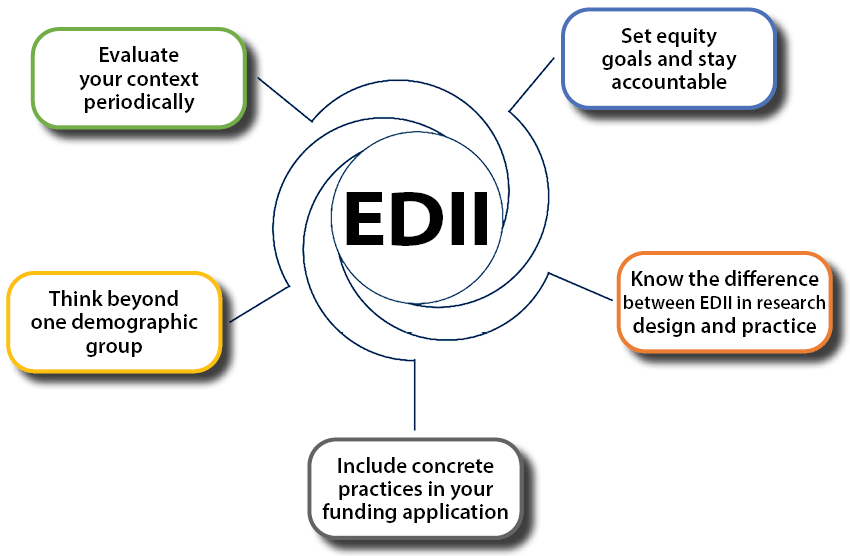Equity, Diversity, Inclusion and Indigenization (EDII) strengthen scientific communities and contribute to creating the innovative and impactful research necessary to respond to local, national and global challenges. Wise practices in EDII span many aspects of research including the composition of a research team, training and mentorship, accessible and inclusive work environment, research design, knowledge mobilization and data management.
Addressing systemic barriers and implementing wise practices in EDII are integral to achieving success in Tri-Agency funding competitions. Queen’s has compiled an extensive list of EDII resources to support the integration of EDII in your research program, projects and research environment. A team of dedicated Research Project Advisors is available to discuss your ideas with you and provide guidance and feedback.
This page provides some general tips and recommendations on how to address the EDII considerations in your practices and successfully communicate an EDII action plan in your funding application.
There is no “one size fits all” approach to EDII, but there are several steps you can take to address the EDII considerations in your research practice.
Applying EDII principles in your work culture is an iterative process of incremental change, tailored to a specific research and institutional environment. Generally, this process involves the following steps:
- Analyze your context (your research team, department, institution and field), and personal level of engagement with EDII
- Set equity goals and develop an EDII plan
- Put your plan into action
- Review your progress and stay accountable
Examples of equity goals may include attracting, hiring, and retaining diverse talent or providing a safe work environment that fosters full participation of members of equity-deserving groups.
Embedding EDII in research design and research practice are two distinct, but complementary approaches.
Embedding EDII in research design (sometimes known as Gender Based Analysis +) means that the EDII considerations are incorporated into each or any stage of the research process (research questions, study design, methodology and data collection, analysis, dissemination of results). Can you collect data that incorporates perspectives of different demographic groups (e.g., gender diverse people, immigrants, persons with disabilities)? How will individuals with different and intersecting social identities (e.g., race, sexuality, class, religion, age) experience the results of your research? How will you ensure that your knowledge dissemination efforts reach diverse audiences?
Applying EDII in research practice involves ensuring diversity in team composition and trainee recruitment, building an inclusive work environment and fostering equity in mentoring and training.
Include concrete practices in the EDII section of your funding application.
Be as specific as possible. Concrete, intentional and clearly described EDII practices are accompanied by specific examples and are designed to create impact that will be measured. The implementation plan is realistic and feasible within the proposed timeframe.
Focusing your EDII efforts on one demographic group is not enough.
Include different equity deserving groups (e.g., women, Indigenous Peoples, members of racialized groups, and persons with disabilities) in your EDII action plan.
Evaluate your context periodically.
EDII practices are constantly evolving. Make time to evaluate your context based on the latest standards in EDII. What groups are missing from your research practice/design and why? What initiatives can you add to advance your goals? How will you ensure that your research environment is/continues to be diverse and inclusive?
